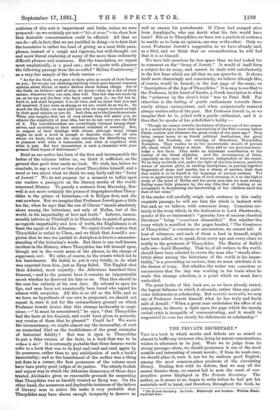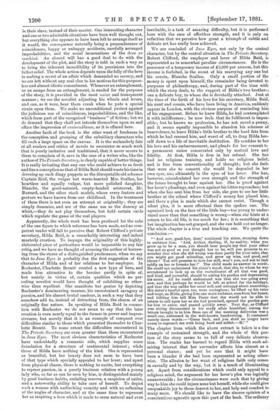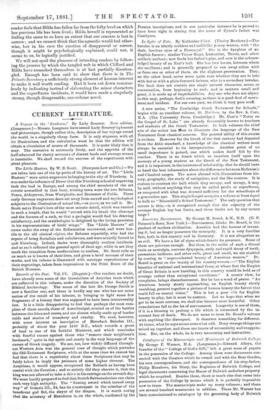THE PRIVATE SECRETARY.* Tnis is a book in which merits
and defects are so mixed as almost to baffle any reviewer who, being by nature conscientious, wishes in utterance to be just. Were we to judge from its strong passages alone, we should pronounce it one of the most notable and interesting of recent novels ; if from its weak ones, we should place it, were it not for its uniform good English, among the most common-place products of the circulating library. Dealing first with its defects, that we may all the sooner dismiss them, we cannot fail to note the want of con- structive power displayed in The Private Secretary. The author, as it seems to us, began to write before he had got his materials well in hand, and therefore, throughout the book, he
• The Private Secretary. In S eels. Edinburgh and London : Williams Mask- wood and Bona.
is their slave, instead of their master. One interesting character and one or two admirable situations have been well thought out, but everything else appears to have been left to arrange itself as it would, the consequence naturally being a preponderance of coincidences, happy or unhappy accidents, carefully arranged improbabilities, and the usual incarnations of the dela ex madtind. An absurd will has a good deal to do with the development of the plot, and the story is told in such a way as to bring the inherent incredibility_ of its provisions into the fullest relief. The whole action depends upon the folly of the hero in making a secret of an affair which demanded no secrecy, and we are left without any real clue to his motives for this purpose- less and almost idiotic concealment. Whenever an entanglement, or an escape from an entanglement, is needed for the purposes of the story, it is provided in the most naïve and transparent manner ; we see the novelist adjusting his wheels and levers, and can, as it were, hear them creak when he puts a special strain upon them. We make no unconditional protest against the judicious use of coincidences, improbabilities, and the like, which form part of the recognised " business " of fiction; but we do demand that they shall not intrude themselves upon us and efface the impression of vraiserablance, as it is effaced here.
Another fault of the book is the utter want of freshness in the conception and grouping of the subsidiary characters who fill such a large space on the canvas. It is the melancholy fate of all readers and critics of novels to encounter no much work that is purely imitative and traditional, that it never occurs to them to complain of it, save in the case of a writer who, like the author of The Private Secretary, is clearly capable of better things. It is really irritating that any one who could achieve to so fresh and fine a conception as that of Hilda Reid should waste his time in dressing up such dingy puppets as the disreputable old schemer Captain Reid, the vulgar but warm-hearted Mrs. Scallan, her 'heartless and equally vulgar, but more polished daughter, Blanche, the good-natured, empty-headed aristocrat, Mr. Burrard, and the other stock models, whose every feature and gesture we have known from our childhood. In the treatment of them there is not even an attempt at originality ; they are simply dummies, and are of the same use as the dummy at whist, —they do not play themselves, but hold certain cards which regulate the game of the real players.
Apparently, the whole work has been produced for the sake of the one figure to which reference has been made, and no com- petent reader will fail to perceive that Robert Clifford's private secretary, Hilda Reid, is a remarkably interesting and indeed masterly creation. To impugn the originality of this highly- elaborated piece of portraiture would be impossible to any fair critic, and we have no thought of accusing the author of borrow- ing from the stores of a distinguished predecessor, when we say that to Jane Eyre is probably due the first suggestion of the character of Hilda and of her relations to her employer. In Rochester, Charlotte Bronte created a new type of hero, and made him attractive to the heroine partly in spite of, but mainly in virtue of, certain qualities which no pre- ceding novelist would have thought of exhibiting as other- wise than repellent. She manifests her genius by depicting Rochester's domineering manner, his unrestrained savagery of passion, and his almost brutal candour, in such a way that they somehow add to, instead of detracting from, the charm of an originally fine nature. In speaking of Hilda Reid in connec- tion with Rochester we do not mean to say that the later creation is even nearly equal to the former in power and impres- siveness, but merely that it is an example of conquest over difficulties similar to those which presented themselve to Char- lotte Brontë. To some extent the difficulties encountered in The Private Secretary are even greater than those encountered in Jane Eyre. The most obvious characteristics of Rochester have undoubtedly a romantic side, which supplies some foundation for a structure of sentimental interest ; while those of Hilda have nothing of the kind. She is represented as beautiful, but her beauty does not seem to have been of that type which specially appealed to her lover; and apart from physical charm, there is nothing to excite, but everything to repress passion, in a purely business relation with a young lady who, so far as can be seen by him, is distinguished mainly by good business habits, unfailing reserve, a suspicion of satire, and a noteworthy ability to take care of herself. To depict such a woman with unflinching veracity and with no softening or the angles of character, and at the same time to represent her as inspiring a love which is made to seem natural and even inevitable, is a task of amazing difficulty, but it is performed here with the ease of effortless strength, and it is only on reflection that we perceive how great a triumph of subtle and delicate art has really been achieved.
We are reminded of Jane Eyre, not only by the central character, but by the central situation in The Private Secretary. Robert Clifford, the employer and lover of Hilda Reid, is represented as in somewhat peculiar circumstances. He is the possessor of a temporary income of £5,000 per annum, but this income is forfeited, in the event of his marrying any one but his cousin, Blanche Scallan. Only a small portion of the money is spent upon himself, the remainder being devoted to purposes of philanthropy, and, during part of the time with which the story deals, to the support of Hilda's two brother, one a delicate boy, to whom she is devotedly attached. Just at the time of the birth of his love for his secretary, Hilda Reid, his aunt and cousin, who have been living in America, suddenly appear in London, with the obvious purpose of reminding him of his engagement. Before he knew Hilda, he had contemplated it with indifference ; he now feels that its fulfilment is impos- sible; but he knows no profession, he has not saved a penny, and it seems equally impossible to abandon his schemes of benevolence, to leave Hilda's little brother to the hard fate from which he had rescued him, and worst of all, to drag Hilda her- self down to a life of inevitable destitution. He confides to her his love and his embarrassment, and pleads for her consent to a permanent union consecrated only by mutual love and fidelity. At first, Hilda is firm in her refusal. She has had no religious training, and holds no religious belief,. and is free from conventionality of thought; but she feels that were she to consent she would be degraded in her own eyes, and ultimately in the eyes of her lover. She has,. however, miscalculated her own strength and the strength of the forces brought to bear against her. She is proof against her lover's pleadings, and even against his bitter reproaches; but when she has sent him from her side, she goes to see her little brother at the school where Clifford's money has placed him, and there a plea is made which she cannot resist. Though a silent plea, it is more effectual than the spoken one. The- agonised look on the face Of the little boy—too young to under- stand more than that something is wrong—when she hints at a return to his old life, is too much for her; it is something that her imagination has not grasped, and she can hold out no longer.. The whole chapter is a true and touching one. We quote the- conclusion
And now, good-bye, dear,' continued his sister, stooping down to embrace him. 'And, Arthur, darling, if, by-and-by, when you grow up to be a man, you should hear people say that your sister was not so good as you thought her to be, will you promise to re- member that what she did wrong was done partly for your sake, that you might get good schooling, and grow up wise, and good, and clever ? You will promise to love her still, won't you, and not to look coldly on her or forsake her ?' The child made no answer in words. He could not understand his sister's mood, that she, to whom he was accustomed to look up as the embodiment of all that was good, and kind, and powerful, should be asking his pardon and deprecating his scorn. All he could understand was that she was going away now, and that perhaps he would be left at school for the holidays, and that she was unlike her usual self, and unhappy about something.. His sister's tearful eyes, too, were contagious ; he lifted up his voice and wept, as Hilda, giving him one more embrace, rose from her knees, and bidding him tell Miss Pasco that she would not be able to return to call upon her as she had promised, opened the garden gate for him to enter, and passed quickly away. Next day, as Clifford was sitting disconsolate in his study after breakfast, among the letters brought in to him from one of the morning deliveries was a small one, addressed in the well-known handwriting. It contained merely these words :—` Come back, and you shall no longer have cause to reproach me with being bard and selfish.—H.'"
The chapter from which the above extract is taken is a fine example of restrained strength, and the whole of this por- tion of the story seems to us full of very delicate observa- tion. The reader has learned to regard Hilda with such ad- miring interest that her surrender affects him almost as a personal shame ; and yet he sees that it might have been a blunder if she had been represented as acting other- wise. The allusion to her want of religious faith only comes in casually and by the way, but it is a touch of illuminating art. Apart from considerations which could only appeal to a
religious mind, the argument for her lover's plea was logically- unanswerable ; for the circumstances were such that by giving way to him she could injure none but herself, while she could give unspeakable joy to those dearest to her, and help and comfort to many more. We should like to have the sincere opinion of a
conscientious agnostic upon this part of the book. The ordinary
reader feels that Hilda has fallen far from the lofty level on which her previous life has been lived ; Hilda herself is represented as feeling the same to so keen an extent that our censure is lost in sorrow ; and we cannot think that the agnostic would feel other- wise, but in his case the emotion of disapproval or sorrow, -though it might be psychologically explained, could not, it seems to us, be logically justified.
We will not spoil the pleasure of intending readers by follow- ing the process by which the tangled web in which Clifford and Hilda have enmeshed themselves is at last partially disentan- gled. Enough has been said to show that there is in The Private Secretary a sufficiently strong element of human interest to make it well worth reading. Had it been cut down remorse- lessly by indicating instead of elaborating the minor characters and the superfluous incidents, it would have made a singularly Istrong, though disagreeable, one-volume novel.
































 Previous page
Previous page